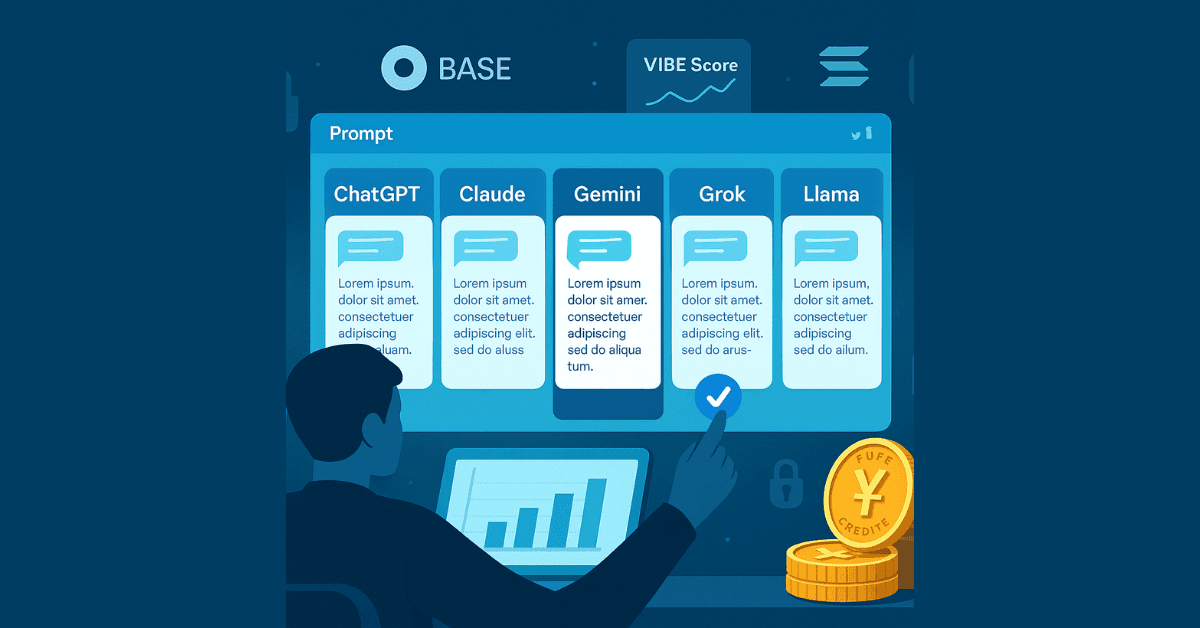
Yupp raises 33 million USD for its AI Agent platform.
Overview of Yupp
Yupp is an AI aggregation platform that allows users to submit the same prompt and directly compare responses from multiple AI models such as ChatGPT, Claude, Gemini, Grok, or Llama.
After receiving responses from the models, users can select the most suitable answer. This selection not only enhances the personal experience but also serves as training data for AI models through two key methods: RLHF (Reinforcement Learning from Human Feedback) and DPO (Direct Preference Optimization), helping improve the quality and human alignment of AI responses.
As of now, Yupp has not released any information regarding its tokenomics. This article will be updated as soon as an official announcement is made.
Why Was Yupp Created?
Yupp was developed to address one of the major challenges in the field of artificial intelligence: evaluating the effectiveness of AI models. As models become increasingly diverse and complex, identifying the most suitable model for specific use cases becomes essential.
However, current ranking systems often suffer from three major limitations: lack of transparency in evaluation processes, bias toward large or commercial models, and limited access to evaluation data for emerging model developers.
Yupp aims to solve these issues through its VIBE Score (Vibe Intelligence Benchmark) — a scoring method based on real-world feedback from a global user community. Users compare and select the best responses from various AI models for the same prompt, creating reliable input data for model evaluation.
Each user interaction serves as a real-world evaluation signal, helping build a fair and objective measurement system.
Instead of relying solely on a panel of experts or limited algorithms, Yupp uses crowdsourced intelligence to establish a new standard for ranking AI models.
This model not only promotes fairness in AI development and access but also ensures that evaluations reflect real-world needs and user experiences. It creates a transparent, participatory evaluation system that helps improve the quality of AI models.
How Yupp Works & Its Incentive Program
VIBE Score: How It Works
The VIBE Score system collects and aggregates user feedback when interacting with AI models. Each response is evaluated not only through quantitative metrics such as accuracy, response time, language style, and usefulness, but also through qualitative factors like creativity, coherence, and reliability.
Unlike simple model comparison methods, Yupp goes further by deeply analyzing the context of each interaction.
The evaluation system considers factors such as the prompt’s intent (e.g., information retrieval, entertainment, analysis), content topic (e.g., politics, science, education), language used, and user profile data (e.g., age, profession, education level).
As a result, Yupp doesn’t just generate an overall score for each model but builds a rich, contextual evaluation system to determine which AI model is best suited for specific user groups and use cases.
Users are encouraged to provide detailed feedback, not just simple “like” or “dislike” choices. They can explain their reasoning, offer specific comments, and conduct in-depth evaluations, helping the system gather more accurate data on user experience.
According to the project, all feedback is processed transparently and securely. Yupp publicly shares its scoring methodology, applies bias control techniques, and implements tools to detect fraudulent behavior such as spam, bots, or inaccurate evaluations.
Yupp Credits: Incentive Program
The Yupp Credits program is designed to encourage users to contribute high-quality feedback. Upon registration, users receive a certain amount of Yupp Credits to try out top AI models like GPT-4o, Claude 3 Opus, and Gemini.
Each time a user provides high-quality feedback, they earn more credits, creating a positive feedback loop between usage and contribution. Notably, Yupp allows users to convert a portion of their credits into cash (USD, EUR, etc.) or stablecoins on the Base and Solana networks via payment partners like Stripe, PayPal, and Coinbase.
This is a significant step toward tokenizing contributions, ensuring that the value of user feedback is recognized and transparently shared. Yupp is committed to protecting user privacy, with all prompts set to private by default and only shared when users choose to make them public. Even when chats are shared, all personal information remains confidential and fully anonymized.
Yupp Backed by a16z and Coinbase Ventures
On June 13, 2025, Yupp announced the successful completion of its Seed funding round, raising 33 million USD. The round was led by a16z, with participation from Coinbase Ventures and individual investors such as Kunal Shah and Gokul Rajaram (board members of Coinbase and Pinterest).
Similar Projects
● Auki: A DePIN protocol developing technology to equip machines, devices, and AI models with “spatial awareness,” enabling them to interact and perceive effectively in real-world physical environments.
●Bagel: A data infrastructure system that builds the foundation for open-source AI applications.